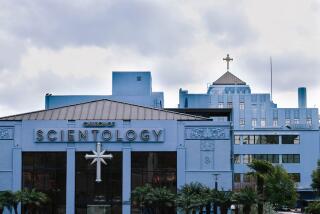Scientology Tenets Not Trade Secrets, U.S. Court Rules
A federal appeals court ruled Friday that the Church of Scientology’s confidential teachings are not protected by California trade secrets law, dealing a blow to the organization’s hard-fought campaign to block former members from operating rival churches where courses are offered at a fraction of the cost.
In its unanimous opinion, a three-judge panel of the U.S. 9th Circuit Court of Appeals said the state law protects economic, but not religious, secrets.
The ruling represents a second major setback in less than a month for the controversial group. On July 22, a Los Angeles Superior Court jury awarded $30 million to a disaffected member who claimed that the church wrecked him mentally and financially.
Splinter Group Sued
Friday’s ruling stemmed from an unusual lawsuit the church filed in Los Angeles federal court last year against a Santa Barbara-based Scientology splinter group called the Advanced Ability Center. The suit accused the Advanced Ability Center and others of entering into a conspiracy to disseminate certain confidential church teachings stolen in 1983 from a Scientology branch in Denmark.
The stolen materials were returned, and Danish authorities jailed the man who took them. However, the church contended in its lawsuit that copies were unlawfully sent to the splinter Scientology groups in the United States.
The Church of Scientology not only contended that the confidential materials, called NOTS, were stolen and distributed in violation of federal racketeering laws but that the materials were protected against use by others under California’s commercial trade secrets law.
In November, U.S. District Judge Mariana R. Pfaelzer of Los Angeles rendered a major victory for the church, saying that the religious programs did appear to be covered by the commercial trade secrets law. She said there was sufficient evidence suggesting that David Mayo, founder of the Advanced Ability Center, had obtained the stolen documents.
Pfaelzer issued a preliminary injunction barring further distribution of the confidential materials until a trial could resolve the issue. The injunction effectively put the Advanced Ability Center, also known as the Church of the New Civilization, out of business.
In its 38-page opinion, the appeals court said Pfaelzer erred and that the injunction should not have been issued.
Same as Scriptures?
“We hold that the California courts would conclude that sacred Scriptures do not meet the definition of a trade secret under California law,” Judge Harry Pregerson wrote for the court.
The Church of Scientology, the judges said, did not contend that it would suffer economic damage by release of the materials. “Indeed, to do so would raise grave doubts about its claim as a religion and a not-for-profit corporation,” they added.
Instead, according to the opinion, the church argued that distribution of the materials outside the church’s control could spiritually harm anyone who had not been prepared for the revelations through earlier courses.
Reached in Palo Alto, Mayo hailed the circuit court decision as a victory for religious freedom.
“My contention is that any philosophical or religious idea that can be of benefit to mankind should be available to mankind,” he said. “The idea of trying to protect a religious idea or a philosophical idea as a trade secret is not only a violation of the Constitution, but it’s ethically wrong.”
The Rev. Heber Jentzsch, president of the Church of Scientology International, said the church will explore several options, including an appeal. He reiterated the church’s complaint that the materials were stolen by “an apostate member” and “illegally used by apostates to make a quick buck.”
Considered Expensive
The splinter churches say that the Church of Scientology charges far too much for its courses. For example, at the church headquarters in Florida, one upper-level course costs $12,100, while Mayo charged $1,500 for his version of the same course.
In addition to reversing the lower court, the 9th Circuit judges rendered a new interpretation of the federal Racketeering Influenced and Corrupt Organization Act, under which Scientology filed its suit.
The appeals court said the church was not entitled to obtain injunctive relief under the act, though it could press for damages to be awarded at the end of the trial.
The judges said Congress sent a “clear message” when it passed the racketeering act that private groups have no power to use preliminary injunctions to block business practices that they claim are objectionable.
First Amendment
Referring to broader First Amendment issues, the judges also questioned whether a court can in effect curtail the religious practices of ex-Scientologists.
Pending an appeal, the case now goes back to Pfaelzer’s court. No date has been set for the start of a trial.
At the same time that the Church of Scientology is fighting Mayo and others in federal court over use of its confidential materials, Scientologists have been demonstrating daily in downtown Los Angeles to protest a jury’s $30-million damage award to Larry Wollersheim, a former Scientologist. Church attorneys say they plan to seek a new trial in that case.
More to Read
Sign up for Essential California
The most important California stories and recommendations in your inbox every morning.
You may occasionally receive promotional content from the Los Angeles Times.









